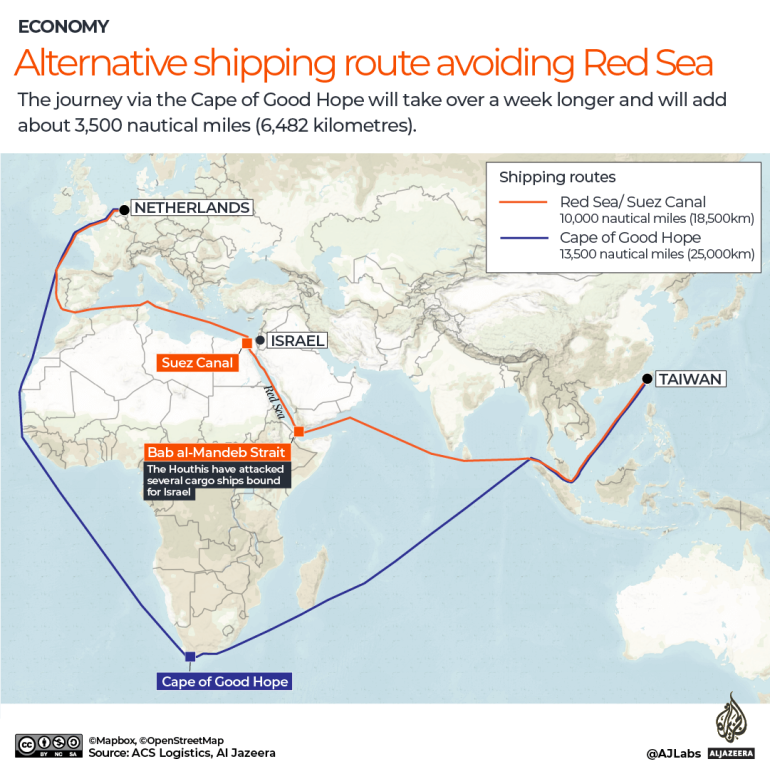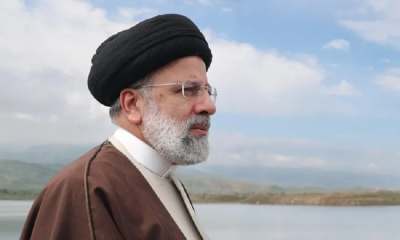Business
Oil prices steady despite Middle East tensions, but risks are rising

In recent weeks, missile and drone attacks on cargo ships crossing the Red Sea have caused the biggest disruption to global trade since the COVID-19 pandemic. Despite delayed supplies, however, oil prices have remained surprisingly stable.
In response to Israel’s war on Gaza, Houthi rebels – the Iran-aligned Shia movement that controls northern Yemen and its western coastline – have launched a wave of assaults on ships in the Red Sea. By targeting vessels with perceived links to Israel, they are attempting to force Tel Aviv to stop the war and admit full humanitarian aid into Gaza. Houthis have launched at least 26 separate attacks since November 19 on merchant freighters.
Though no ships have yet been sunk, the United States recently dispatched a multinational naval task force to the region. On December 31, American Navy helicopters killed 10 Houthi fighters and sank three of the group’s speedboats.
The following day, Iran dispatched its Alborz warship to the Red Sea, compounding an already volatile situation. The government did not provide information on the vessel’s mission.
On Wednesday, Houthi rebels fired their largest barrage of projectiles yet, forcing an engagement with US and British naval forces. On Thursday night, the US and UK led a bombing campaign against multiple Houthi facilities in Yemen.
While Brent crude briefly topped $80 per barrel after Thursday’s air strikes, oil prices have mostly trended sideways in recent weeks. Market fundamentals suggest a balanced, or slightly surplus, market. And until there is a clear threat to global supply, traders appear to have relegated tensions in the Middle East to background noise.
Houthi activity has so far been concentrated in the narrow strait of Bab al-Mandab, which connects the Gulf of Aden to the Red Sea. Approximately 50 ships sail through the strait every day, heading to and from the Suez Canal – a central artery for global trade.
Some of the world’s largest shipping companies have suspended transit in the region, forcing vessels to sail around the Cape of Good Hope in Southern Africa. The lengthier route has raised freight rates due to higher fuel, crew and insurance costs.

According to Clarksons, a shipbroker, roughly 24,000 vessels crossed the Suez Canal last year. That amounts to one-tenth of global trade, including 10 percent of seaborne oil and 8 percent of liquefied natural gas.
Ships travelling through the Suez Canal have taken on greater strategic significance since the war in Ukraine, as Russian sanctions have made Europe more dependent on oil from the Middle East, which supplies one-third of the world’s Brent crude, the international benchmark.
“The region is an important channel for freight, representing almost one-third of global container capacity. As such, Houthi-linked bottlenecks pose a new risk to inflation,” said Rahul Sharan, a senior manager for maritime consultancy Drewry.
“We’ve seen hundreds of vessels rerouted from the Suez Canal in recent months. We don’t yet have visibility on which industries have been most severely affected, but consumer goods costs could rise if oil and gas prices increase.”
Despite diverting supplies from the Suez Canal, tensions in the Red Sea have so far had a muted impact on energy prices. “We’ve seen plenty of volatility, so geopolitical risks are being considered. But not enough to lift prices,” says energy trader Mohammed Yagoub.
“The truth is that headline fatigue has set in. There’s been a lot of coverage on tensions in the Red Sea, especially today. But global supplies have remained broadly steady in recent weeks,” Yagoub told Al Jazeera.
“You have to remember that the oil can still travel around Africa, as well as from ports in western Saudi Arabia, bypassing the need to cross Bab al-Mandeb.” The Houthis, he said, were also unlikely to attack ships from friendly oil and gas-producing countries in the region.
There are other factors at play – recent record US production, the lifting of oil sanctions in Venezuela and tepid global demand, Yagoub added.
However, looking ahead, he warned that “tensions in Iran, especially around Hormuz, could move the needle on prices.”
Approximately 17 million barrels of crude oil, nearly one-sixth of global supply, are transported on a daily basis through the Strait of Hormuz, between the Arabian Gulf and the Gulf of Oman. If Iran became actively engaged in the conflict, Tehran could threaten to close this vital channel.
Any such closure could see crude prices surge by 20 percent in a month and higher thereafter, according to Callum Bruce, an analyst at Goldman Sachs. “It would be a huge, huge shock. For now, though, the implied market probability of that happening is less than 1 percent,” he said. Tehran has appeared reluctant to engage in military conflict with the US military and its economy remains fragile.
Bruce pointed out that “oil traders will continue paying close attention to activity in the Middle East. Gaza is ground zero. Then, you have the Red Sea. Tensions across the region have also ratcheted up in recent weeks.”
On January 2, senior Hamas leader Saleh al-Arouri was killed in Beirut by an Israeli drone raid following three months of hostilities at the Lebanon-Israel border. It was the first air raid on Beirut since 2006.
This past week, Israel assassinated a Hezbollah commander in south Lebanon, while Hezbollah, which has Iranian support, struck a sensitive Israeli base with rockets. Meanwhile, Iran-backed groups in Iraq have stepped up attacks on US military bases.
For his part, US President Joe Biden has said he is keen to prevent the war on Gaza from spiralling into an all-out regional conflagration, though the bombing of Yemen has been viewed by the Houthis as an escalation. On Sunday, US Secretary of State Anthony Blinken was dispatched to the Middle East on a diplomatic trip for the fourth time in three months.
“Israel’s war with Hamas seems to have energised already existing tensions,” said Bruce. “And while US naval activity in the Red Sea provoked headlines, economic essentials are continuing to dictate oil prices.”
Mohammed Yagoub added, “It’s true that mega-trends are pre-occupying traders. But the likelihood of a regional conflict will increase the longer the fighting in Gaza persists. Yemen is proving that. So, you could make the case that oil traders are too sanguine right now.”
(Aljazeera)
Business
AHK Sri Lanka champions first-ever Sri Lankan delegation at Drupa 2024

The Delegation of German Industry and Commerce in Sri Lanka (AHK Sri Lanka) proudly facilitated the first-ever Sri Lankan delegation’s participation at Drupa 2024, the world’s largest trade fair for the printing industry and technology. Held after an eight-year hiatus, Drupa 2024 was a landmark event, marking significant advancements and opportunities in the global printing industry.
AHK Sri Lanka played a pivotal role in organising and supporting the delegation, which comprised 17 members from the Sri Lanka Association for Printers (SLAP), representing eight companies from the commercial, newspaper, stationery printing, and packaging industries. This pioneering effort by AHK Sri Lanka not only showcased the diverse capabilities of Sri Lanka’s printing sector but also facilitated vital bilateral discussions with key stakeholders from the German printing industry.
Business
Unveiling Ayugiri: Browns Hotels & Resorts sets the stage for a new era in luxury Ayurveda Wellness

In a captivating reimagining of luxury wellness tourism, Browns Hotels & Resorts proudly unveiled the exquisite Ayugiri Ayurveda Wellness Resort Sigiriya. This momentous occasion, celebrated amidst a vibrant and serene grand opening on the 6th of June, heralds a new chapter in the Ayurveda wellness tourism landscape in Sri Lanka. Nestled amidst 54 acres of unspoiled natural splendour, Ayugiri features 22 exclusive suites and stands out as the only luxury Ayurveda wellness resort in the country offering plunge pools in every room, rendering it truly one-of-a-kind.
The grand opening of Ayugiri Ayurveda Wellness Resort was an enchanting event, where guests were captivated by the melodies of flutists and violinists resonating through Sigiriya’s lush landscapes. As traditional drummers and dancers infused the air with vibrant energy, Browns Hotels & Resorts’ CEO, Eksath Wijeratne, Kotaro Katsuki, Acting Ambassador for the Embassy of Japan and General Manager, Buwaneka Bandara, unveiled the resort’s new logo, marking a significant moment witnessed by distinguished guests from the French Embassy, Ayurveda and wellness enthusiasts along with officials from the Sigiriya area, LOLC Holdings and Browns Group.
“Our strategic expansion into wellness tourism with Ayugiri Ayurveda Wellness Resort Sigiriya symbolises a significant milestone for Browns Hotels & Resorts. Wellness tourism has consistently outperformed the overall tourism industry for over a decade, reflecting a growing global interest in travel that goes beyond leisure to offer rejuvenation and holistic well-being. By integrating the timeless wisdom of Ayurveda with modern luxury, we aim to set a new standard in luxury wellness tourism in Sri Lanka. Whether your goal is prevention, healing, or a deeper connection to inner harmony, Ayugiri offers a sanctuary for holistic well-being” stated Eksath Wijeratne.
Ayugiri encapsulates the essence of life, inspired by the lotus flower held by the graceful queens of the infamous Sigiriya frescoes. Just as the lotus emerges from the murky depths, untainted and serene,
Ayugiri invites guests on a journey of purity and rejuvenation, harmonised with a balance of mind, body and spirit, the essence of nature, echoes of culture and the wisdom of ancient Ayurvedic healing.
Business
HNB General Insurance recognized as Best General Bancassurance Provider in Sri Lanka 2024

HNB General Insurance, one of Sri Lanka’s leading general insurance providers, has been honored as the Best General Bancassurance Provider in Sri Lanka 2024 by the prestigious Global Banking and Finance Review – UK.
The esteemed accolade underscores HNB General Insurance’s unwavering commitment to excellence and its outstanding performance in the field of bancassurance. Through dedication and hard work, the HNB General Insurance team has continuously endeavored to deliver innovative insurance solutions, cultivate strong relationships with banking partners, and provide unparalleled service to customers nationwide. This recognition is a testament to the team’s dedication and relentless pursuit of excellence in the bancassurance business.
“We are honored to receive this prestigious award, which reflects our team’s tireless efforts and dedication to delivering value-added insurance solutions and exceptional service through our bancassurance partnerships,” said Sithumina Jayasundara, CEO of HNB General Insurance. “This recognition reaffirms our position as a trusted insurance provider in Sri Lanka and motivates us to continue striving for excellence in serving our customers and communities.”






















